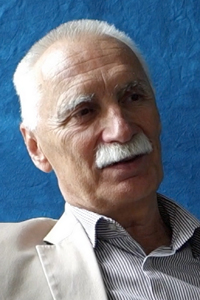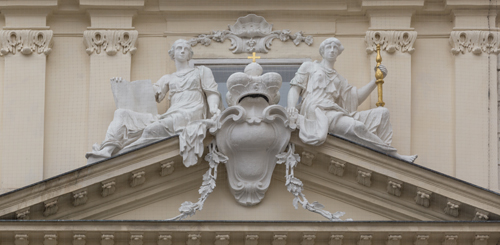
Your complimentary articles
You’ve read one of your four complimentary articles for this month.
You can read four articles free per month. To have complete access to the thousands of philosophy articles on this site, please
Interview
Karl Sigmund
Karl Sigmund is an emeritus professor of mathematics at the University of Vienna. He has made major contributions to evolutionary game theory and to the history of the Vienna Circle, who met regularly in Vienna from 1924-1936. Katharine Mullen talks with him about mathematics, and about the Vienna Circle.
On the walk to interview Sigmund at one of Vienna’s storied coffee houses, I crossed in front of the Secession Building, an architectural marvel built in 1898 to house modern art. The facade is inscribed: “To every age its art, to art its freedom.” Sigmund’s book The Waltz of Reason could have a similar motto: “To every age its mathematics, to mathematics its freedom.”
The Waltz of Reason (Basic Books, 2023) surveys two millennia of the interplay between mathematics and philosophy. Every age, from the ancient Greeks to the present day, has asked philosophical questions regarding what mathematics means and what it can show us. Sigmund uses examples and asides to “cover a vast territory lightly”, as he puts it, in a broad history that will be of interest to any mathematically-inclined reader. The thrill of this dance is in its dizzying scope.

Sigmund was born in the last months of the Second World War, after the Third Reich had driven many Viennese intellectuals into exile and murdered a third of the city’s Jews. This history was addressed in his previous book, Exact Thinking in Demented Times: The Vienna Circle and the Epic Quest for the Foundations of Science (Basic Books, 2017).
The Waltz of Reason dances around the question of whether mathematics is discovered or invented, which is to say whether it’s a window into a Platonic realm of objective truth [this is the idea that mathematical truths have an independent reality, Ed] or merely a language that we set up according to our own lights. I’m wondering if you take a side yourself?
There is an old saying that mathematicians are Platonists on weekdays and formalists on Sundays. I lean in this direction myself. I cannot settle on one view or another. And so many better brains have wrestled with that question without finding a definite answer, so I’m not even trying any longer.
This question tormented the mathematical philosopher Kurt Gödel, as you discuss.
It didn’t torment Ludwig Wittgenstein! Wittgenstein always seemed to know that of course mathematics is invented!
You talk about alternative mathematical systems, and about whether alien civilizations could come up with different mathematics from our own. I’m wondering whether it’s really possible to imagine a mathematics that’s utterly different in the sense that even the counting numbers aren’t a part of the system. Or is a mathematics based on the counting numbers what every alien civilization would come to?
Many mathematical theories – geometries, topologies, algebraic systems, and so forth – could have evolved differently and played different roles in physics and other applications. But counting seems so extremely basic. I couldn’t imagine a mathematics without counting. It is the granite bedrock of mathematical Platonism. Everything else can be imagined as invented. But basic numbers certainly not.
As you describe in The Waltz of Reason, the seventeenth century philosopher and mathematician Gottfried Wilhelm Leibniz hoped for a reasoning machine so powerful it could settle any human argument. Do you have any optimism that our new, powerful reasoning machines will help us come to a consensus on difficult issues?
I have absolutely no optimism about this, but that could be just a reflection of my age. As for Leibniz, he was of course a genius and conversant in practically every aspect of intellectual life; but there was one thing he was missing – namely, he didn’t have an evolutionary viewpoint. He did not see that humans are a product of evolution, and that our nature, and our conflicts of interest, are a product of an enormously long biological and social evolution. I believe that this evolved human nature is much more important than any system meant to provide the rules for dealing with problems. And I guess the old biological background will assert itself as long as humanity is not overcome by artificial intelligence.
You quote Goethe, who wrote that “Mathematicians are a kind of Frenchmen: whenever you talk to them, they translate it into their language and right away it is something different.” I wonder if you found this quote applicable when you were pursuing your own research into evolutionary games?
I have always been skeptical about applications of game theory to practical problems. I think that humans are accustomed to deal with practical problems on a more or less instinctive basis. We have developed intuitions, just as we have developed motor skills to play ball, which we apply very well without any awareness of any underlying theory. In my view the main task of game theory is in providing insight into evolutionary principles, but it does not help us with actual applications. You don’t become a better tennis player when you have studied three terms of mechanics.
In your previous book, Exact Thinking and Demented Times, you describe how the economist Karl Menger and other university professors lost their positions due to their Jewish origins and didn’t get an invitation back after the war. You also discussed how the ‘de-Nazification’ of Austrian universities was rather superficial: some former Nazi party members were quickly re-appointed to professorships, and moved up the ladder. I’m wondering if you understood all this in hindsight, or if it seemed jarring in the moment as a student in the Sixties?
I was very aware of it at the time. There were, however, many details I didn’t know. Some of my professors were Nazis, as I later found out when I learned their party numbers and so on. I didn’t know all the specifics then, but I felt the atmosphere, and many of my colleagues also felt it. In particular, there was a group in the university that was very explicitly against the philosophy that had been developed before the war in Vienna: Wittgenstein and the Vienna Circle and so on were practically taboo, and their work was considered an aberration. I suffered from that dismissal when I was still studying. But due to influences from abroad and from other Austrian universities, the atmosphere in Viennese philosophy changed. Now it’s a very different department. It’s much better, and completely open. But in the Sixties and Seventies it was like a fortress, trying to hold off any new developments.

Austrian Academy of Sciences, Vienna
© Hubertl 2015, Creative Commons 4.0
The Vienna Circle wasn’t admired locally?
Not by those heading the philosophical establishment. Not at all.
You attended lectures by Béla Juhos, the last member of the Vienna Circle to teach at the University of Vienna, and you wrote that he was disrespected by colleagues.
Yes. He was always given the lousiest lecture room. In the evening sometimes a janitor would even have forgotten to switch on the lights. There were only maybe ten students, including, I should say, a colleague who later became a famous artist, Peter Weibel. In a sense our attendance was a kind of resistance movement. Juhos was already fairly old, and the lectures were not particularly inspired. But for us, it was a kind of a statement. We went there despite the fact that he was so obviously marginalized and pushed aside.
So you’ve admired the Vienna Circle since you were a student?
When I was sixteen or so I found Wittgenstein’s Tractatus in a bookstore in Salzburg. I saw the strange numbering of the sentences. I was curious. I bought the small book, and I fell head over heels. And then I heard about the Vienna Circle. One of my professors had met some of the members in the Thirties. I think that as a student I was already planning to write a history of the Vienna Circle.
What motivated The Waltz of Reason?
I’d always been struck by the fact that undergraduates studying mathematics would so quickly get a new mindset. Not necessarily get smarter, but start thinking in a different way. Within a few months, by gaining some ideas about infinity, proof by induction, and so on, they gained a new perspective. I wanted to convey this mindset. Whether I succeeded is not for me to tell. But in any case, this is the outcome I was interested in introducing, with an elementary amount of mathematics. That doesn’t make you a mathematician at all, but it gives you a different mindset and another standard of precision.
• Katharine Mullen is a writer and computational physicist based in Los Angeles.









